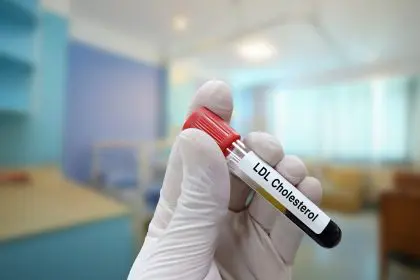Cholesterol is a crucial element in our body’s functioning, but when the levels are too high, it can lead to severe health issues like heart disease, stroke and other cardiovascular problems. Many Americans struggle with high cholesterol — often unknowingly fueling it with the foods they consume daily. Your diet plays a significant role in managing cholesterol levels, and certain foods can significantly impact those numbers. In this article, we’ll explore seven foods to cut from your diet to manage high cholesterol effectively. These changes can make a remarkable difference in your heart health — giving you the chance to live a longer and healthier life.
1. Saturated fats: A major contributor to high cholesterol
One of the biggest culprits in raising LDL (low-density lipoprotein) cholesterol — the “bad” cholesterol — is saturated fats. These are commonly found in:
- Fatty cuts of meat (like beef, pork and lamb)
- Processed meats (such as sausages, hot dogs and bacon)
- Full-fat dairy products (like butter, cheese and whole milk)
Consuming saturated fats increases the production of cholesterol in the liver — which can accumulate in your arteries over time. The American Heart Association recommends limiting saturated fats to less than six percent of your total daily calories. This means that reducing or eliminating these fatty foods from your diet is essential to keeping your cholesterol levels in check. Opting for lean meats, plant-based proteins and low-fat dairy alternatives can significantly improve your overall heart health and reduce your cholesterol levels.
2. Trans fats: The hidden danger in processed foods
Trans fats are not just bad for cholesterol — they are the worst kind. Unlike naturally occurring fats, trans fats are artificial and found in processed and fried foods like:
- Baked goods (cakes, cookies, pies and pastries)
- Margarine and shortening
- Fried fast food (like French fries, fried chicken and doughnuts)
- Packaged snacks (like crackers and microwave popcorn)
These fats not only raise your LDL cholesterol but also lower your HDL (high-density lipoprotein) cholesterol — the “good” cholesterol. The result? A double-edged sword that significantly increases the risk of developing heart disease. The Food and Drug Administration (FDA) has banned the use of trans fats in foods — but they still exist in some products labeled as containing “partially hydrogenated oils.” If you see this on a food label, it’s best to avoid it to protect your heart health and cholesterol levels.
3. Refined carbohydrates and sugary foods
Many people don’t realize that refined carbohydrates and sugary foods can also contribute to high cholesterol. These include:
- White bread and pasta
- Sugary cereals
- Pastries and desserts
- Sugary beverages (like soda and energy drinks)
These foods cause a spike in blood sugar and insulin levels — which can lead to increased cholesterol production in the liver. Moreover, excess sugar consumption is linked to obesity — a key risk factor for high cholesterol and cardiovascular disease. Replacing refined carbs with whole grains like oats, brown rice and quinoa — and choosing naturally sweet foods like fruits — will help you maintain balanced blood sugar and cholesterol levels.
4. Red meat: How much is too much?
While red meat can be an excellent source of protein and nutrients — it is also high in saturated fats and cholesterol. Frequent consumption of red meat like beef, lamb and pork has been linked to higher LDL cholesterol levels. Studies have shown that individuals who consume red meat daily are at a higher risk of heart disease than those who consume plant-based proteins or lean meats like poultry and fish.
If you struggle with high cholesterol, it’s crucial to limit red meat consumption. Opting for leaner cuts when possible or replacing some red meat servings with plant-based proteins like legumes, beans, tofu or fish can help lower your cholesterol and reduce the risk of heart-related issues.
5. Fried foods and fast food: An indulgence with high stakes
Indulging in fried foods occasionally may not seem like a big deal, but frequent consumption can have a devastating effect on your cholesterol levels. Fast-food items like fried chicken, French fries, onion rings and even fried fish are cooked in unhealthy oils — which are often reused — making them high in trans fats. These not only increase your LDL cholesterol but also contribute to obesity and high blood pressure.
When you’re craving fried food, try healthier cooking alternatives like baking, grilling or using an air fryer. Also, when dining out, choose restaurants that offer baked, grilled or steamed options rather than fried, breaded or battered ones.
6. Full-fat dairy products: A hidden source of cholesterol
While dairy is a rich source of calcium and protein, full-fat dairy products are high in saturated fat and cholesterol — contributing to higher LDL cholesterol levels. Foods to watch out for include:
- Whole milk
- Cream
- Full-fat yogurt
- Cheese (especially aged or processed cheeses)
Switching to low-fat or fat-free dairy options, or plant-based alternatives like almond, soy or oat milk, can help lower your saturated fat intake. Incorporating these changes in your daily routine can go a long way toward maintaining a healthy cholesterol level.
7. Processed meats: Tasty but harmful to heart health
Processed meats — such as sausages, bacon, ham and deli meats — are not only high in saturated fat and cholesterol but also contain high levels of sodium and preservatives like nitrates. These additives can further exacerbate cholesterol-related issues and contribute to high blood pressure — increasing your risk of heart disease.
Reducing or eliminating processed meats from your diet is vital if you have high cholesterol. Instead, focus on lean proteins such as skinless chicken, turkey, fish, beans, lentils and nuts. Not only will this help lower your cholesterol, but it will also improve your overall health and reduce your risk of heart complications.
Practical tips for managing high cholesterol
- Read food labels carefully: Be vigilant about reading food labels for ingredients like trans fats, saturated fats and added sugars. Avoid foods that list “partially hydrogenated oils” or contain high levels of these harmful fats.
- Cook at home: Preparing meals at home gives you control over the ingredients and cooking methods — allowing you to opt for healthier choices.
- Incorporate heart-healthy foods: Foods like oats, nuts, avocados, olive oil and fatty fish are excellent for reducing LDL cholesterol and boosting heart health.
- Exercise regularly: Physical activity plays a significant role in managing cholesterol. Aim for at least 150 minutes of moderate-intensity exercise weekly.
- Consult a healthcare professional: Always talk to your doctor or dietitian before making major changes to your diet — especially if you have existing health conditions.
Take control of your cholesterol for a healthier future
High cholesterol is a major health concern, but with dietary changes, it’s manageable. By cutting out foods high in saturated fats, trans fats, refined carbs and processed ingredients, you can significantly lower your cholesterol levels and improve your heart health. Remember, managing cholesterol isn’t just about restriction — it’s about making healthier choices that support your body and lead to a longer, more vibrant life. Start making these changes today and take control of your cholesterol for a healthier future!
This story was created using AI technology.
















